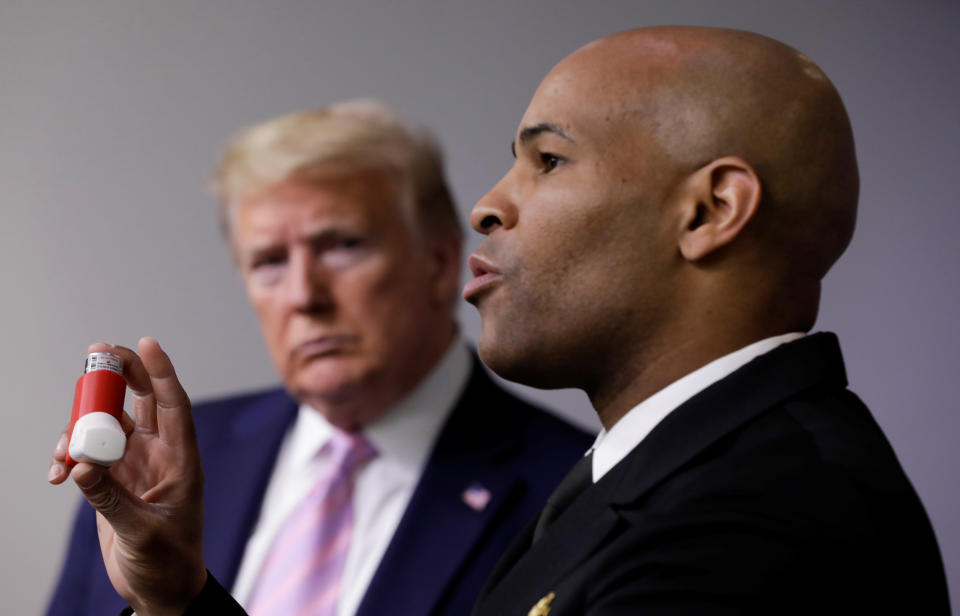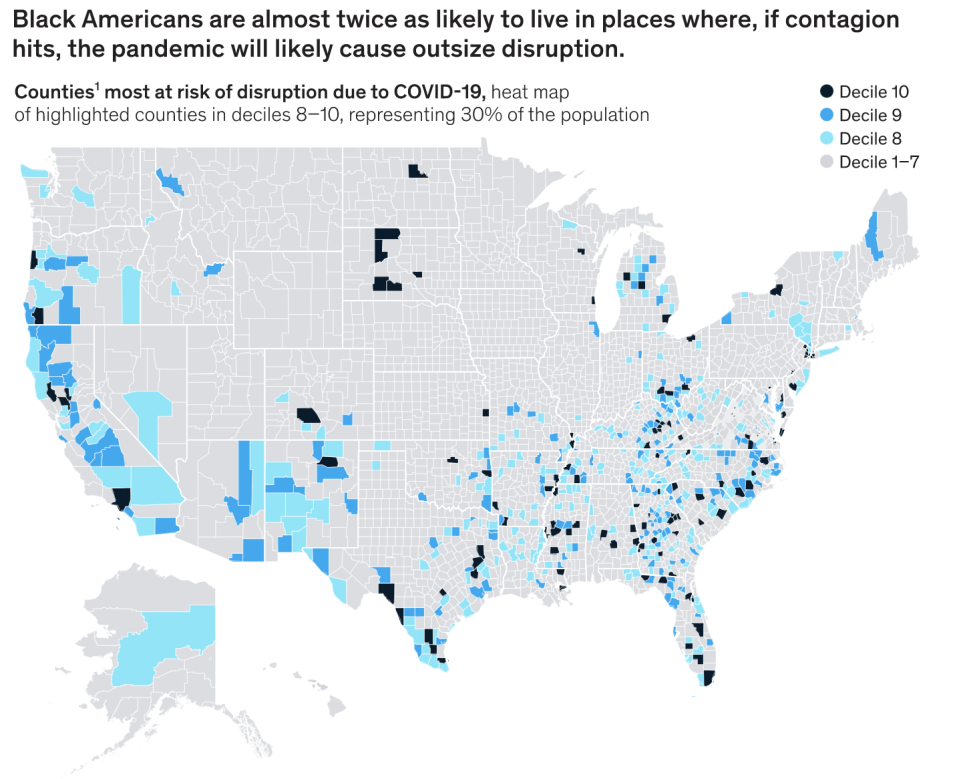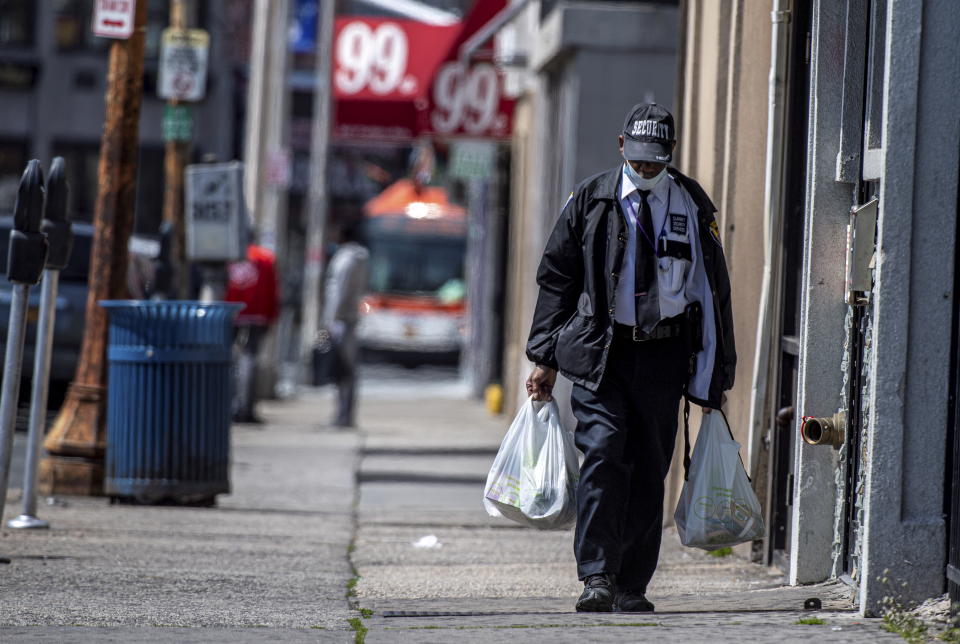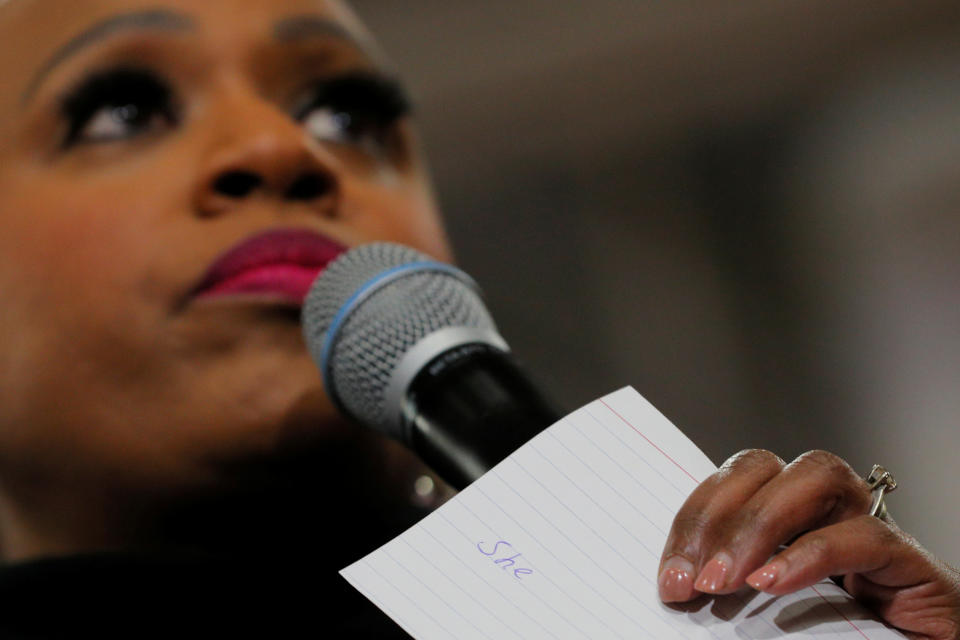Coronavirus delivers a 'highly predictable 1-2 punch' to black Americans: McKinsey study
A new study from consulting firm McKinsey & Company has found that black Americans are at a greater risk for negative financial and health problems from the novel coronavirus compared to their white counterparts.
And while the virus has infected people of all races, ethnicities, and socioeconomic statuses, Shelley Stewart, McKinsey partner and one of the authors of the report, says that the implications for black Americans is “a highly predictable 1-2 punch.”
“It’s not COVID,” he said. “COVID is laying bare some of the long standing socioeconomic implications and realities for lives, health, and livelihoods.”
The impact on health
According to the study, due to a variety of factors, African Americans are more likely to contract the virus, and 30% more likely to have health conditions that exacerbate its effects.
During a coronavirus press briefing last week, Dr. Fauci, director of the National Institute of Allergy and Infectious Diseases (NIAID), said that there has been a “particularly difficult problem of an exacerbation of a health disparity” with coronavirus patients.

“We’ve known, literally forever, that diseases like diabetes, hypertension, obesity, and asthma are disproportionately afflicting the minority populations, particularly the African Americans,” he said. “Unfortunately, when you look at the predisposing conditions … that often lead to death, they are just those very comorbidities that are unfortunately disproportionately prevalent in the African American population.”
In addition to predisposing conditions, blacks are more likely to work in low-wage, high-contact, essential services in healthcare, grocery, or delivery that make it impossible to work from home and minimize their chances of contracting the virus.

There has been little reporting on testing rates across various demographics in the country, but McKinsey found that in 10 of the 16 states where 65% of African Americans live, coronavirus testing was below the median rate for the country.
Coronavirus related deaths have also been higher in the black community, even in states where they make up smaller percentages of the population. In Washington, D.C., the death rate for African Americans stands at 75%, while the death rate for their white counterparts stood at 11%. A similar trend could be seen in Louisiana, where fatalities among blacks stood at 59%, compared to 30% of whites.
The financial impact
And financially, the impacts of coronavirus could be long-lasting. Seven million jobs held by black Americans — a total of 39% — are at risk of temporary or permanent loss and disruption. That’s compared to 34% for whites.
“This 5 point gap is meaningful especially with the economic fragility of black Americans to begin with. The inability to weather the job disruption,” Stewart said.
According to the Bureau of Labor Statistics, black and Hispanic workers are more than twice as likely to earn poverty-level wages compared to their white counterparts.

Roughly 8% of black and Hispanic workers earn wages below poverty level, compared to just 4% of white workers. Women of color struggle in particular: 10% of black women and 9% of Hispanic women are classified as the working poor, compared to 3.5% of white men.
Low-wage workers won’t be the only ones that will be hit financially — so will business owners of color. According to the study, 40% of revenues of black-owned businesses are located in the 5 sectors most vulnerable to coronavirus, including leisure, hospitality, and retail. That’s compared to just 25% of the revenue at risk across all American businesses.
Considering that black populations tend to struggle with access to credit and financial services, these financial hits put already vulnerable communities into even more precarious positions.
“It paints a pretty grim picture,” Stewart said.
The long-term effect
Senator Elizabeth Warren (D-MA) and Congresswoman Ayanna Pressley (D-MA) are among Democrats that have put forth legislation to track the impact of the virus on various demographics, including race and ethnicity.

The Equitable Data Collection and Disclosure on COVID-19 Act of 2020 would require the CDC to provide information about the rate of positive cases, fatalities, and testing across the different groups. The tracking is necessary, Stewart explained.
What’s more, he says, tracking will be critical to ensure that resources are allocated to the most vulnerable populations: regardless of race or ethnicity.
“The one thing that Americans seem to be in agreement on is that resources are needed to mitigate the worst impact of this crisis. It’s not just about black and brown Americans. We need to understand: ‘Who are the most vulnerable populations?’” he said.
And once the pandemic ends, it’s unknown how long communities of color will feel the impact.
“I’m quite concerned,” Stewart explained. “What we’ve seen in prior downturns is that black Americans tend to recover more slowly than the broader economy. We know on average black Americans have 5 days worth of liquid savings compared to 31 days of white Americans. That liquidity speaks to the ability to weather the storm.”
Kristin Myers is a reporter at Yahoo Finance. Follow her on Twitter.
Read more:
Gig workers could increase unemployment claims by another 10%: economist
Republicans raise big amount amid coronavirus crisis
Coronavirus crisis gives Trump political boost
Will you get a ‘coronavirus check’? $2 trillion stimulus package explained
Republican Attorneys General push forward with lawsuit to dismantle Obamacare despite coronavirus
Coronavirus recession to hit over 24 million workers hardest: study
Coronavirus hits Democratic communities harder than Republican counterparts
Read the latest financial and business news from Yahoo Finance
Follow Yahoo Finance on Twitter, Facebook, Instagram, Flipboard, LinkedIn, YouTube, and reddit.
